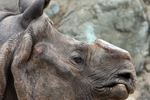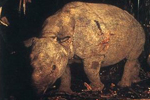A Vietnamese woman ended up in the hospital after consuming rhino horn, reports savingrhinos.org. Used for a rash around her mouth, the rhino horn instead caused a serious allergic reaction, including reddening skin, itching, and fever. Listed under the Convention on International Trade in Endangered Species of Wild Fauna and Flora (CITES), rhino horn is illegal to purchase or sell worldwide.
According VnExpress, Dr. Nguyen Huu Truong at Back Mai Hospital, where the woman was treated, said that rhino horn can easily cause toxicity as well as an allergic reaction. He also stated that there is no medical evidence to back up claims of rhino horn having any medicinal value.
Despite its lack of curative properties, rhino horn is currently being driven by a lucrative black market supplied by organized criminal syndicates. Rhinos are killed, their horns sawed off and then smuggled abroad, usually to Southeast Asia. The price of rhino horn, which has topped both gold and cocaine, has brought an epidemic of poaching across Africa and Asia over the past few years.
In South Africa alone over 170 rhinos have been killed since the beginning of the year, more than one every day.
Currently four of the world’s five rhino species are threatened with extinction, three of these species are considered Critically Endangered. The Javan rhino and the Sumatran rhino are considered among the world’s most imperiled mammals. It is thought the last Javan Rhino surviving in Vietnam (there are still a few dozen on the Indonesian island of Java) was killed by poachers last year. Beyond pushing one of the world’s most iconic animals to extinction, the trade has a human and societal toll: poachers have been killed in the act, and wildlife guards have lost their lives protecting rhinos.
Dr. Nguyen Huu Truong stated that people should seek a medical doctor instead of turning to rhino horn.
Related articles
Belief and butchery: how lies and organized crime are pushing rhinos to extinction

(05/11/2011) Few animals face as violent, as well organized, and as determined an enemy as the world’s rhinos. Across the globe rhinos are being slaughtered in record numbers; on average more than one rhino is killed by poachers everyday. After being shot or drugged, criminals take what they came for: they saw off the animal’s horn. Used in Traditional Chinese Medicine, which claims that it has curative properties, rhino horn is worth more than gold and cocaine on the black market. However, science proves all this cash and death is based on a lie. ‘There is no medicinal benefit to consuming rhino horn. It has been extensively analyzed in separate studies, by different institutions, and rhino horn was found to contain no medical properties whatsoever,’ says Rhishja Larson.
How do we save the Sumatran rhino?

(06/06/2011) Some conservation challenges are more daunting than others. For example, how do you save a species that has been whittled down to just a couple hundred individuals; still faces threats such as deforestation, poaching and trapping; is notoriously difficult to breed in captivity; and is losing precious time because surviving animals are so few and far-apart that simply finding one another—let alone mating and successfully bringing a baby into the world—is unlikely? This is the uphill task that faces conservationists scrambling to save the Sumatran rhino (Dicerorhinus sumatrensis). A new paper in Oryx, aptly named Now or never: what will it take to save the Sumatran rhinoceros Dicerorhinus sumatrensis from extinction? analyzes the conservation challenge, while putting forth a number of recommendations.
Down to 50, conservationists fight to save Javan Rhino from extinction

(05/17/2011) Earlier this year, the International Rhino Foundation launched Operation Javan Rhino to prevent the extinction of the critically endangered Javan Rhinoceros (Rhinoceros sondaicus), formerly found in rain forests across Southeast Asia. Operation Javan Rhino is a multi-layered project which links field conservation, habitat restoration, and management efforts with the interests of local governments and communities. The following is an interview with Susie Ellis, Executive Director of the International Rhino Foundation.







